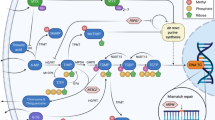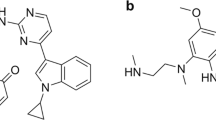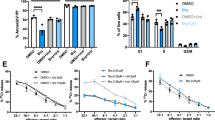Abstract
Thiopurines are frequently used for the treatment of IBD. The complex pharmacology, metabolism, mechanism of action and toxicity profile of these immunosuppressive drugs have now been partly elucidated. The activity of thiopurines is partly mediated by the metabolite 6-thioguanosine 5′-triphosphate, which inhibits the function of the small GTPase Rac1, leading to apoptosis of activated T cells, and influences the conjugation of T cells with antigen-presenting cells. The activity of the enzyme thiopurine S-methyltransferase has a major influence on the bioavailability and toxicity of thiopurines, and several thiopurine metabolites might have adverse effects in patients. Myelotoxicity can be caused by grossly elevated levels of 6-thioguanine nucleotides, and elevated levels of 6-methylmercaptopurine ribonucleotides have been associated with hepatotoxicity. The sensitivity and specificity of these methylated metabolites for predicting thiopurine-induced liver enzyme abnormalities are, however, poor. 6-Thioguanine has been suggested as an alternative to the classical thiopurines azathioprine and 6-mercaptopurine for the treatment of IBD, but there are concerns about its toxicity profile, especially with regard to the induction of nodular regenerative hyperplasia of the liver. Data now suggest that the induction of nodular regenerative hyperplasia of the liver during 6-thioguanine therapy might be dose-dependent or dependent on the level of 6-thioguanine nucleotides.
Key Points
-
The pharmacological activity of thiopurine therapy is in part mediated by the specific metabolite 6-thioguanosine 5′-triphosphate, which induces apoptosis of activated T cells
-
The complex pharmacology and metabolism of thiopurines have been partly elucidated, leading to the development of novel strategies (e.g. metabolite measurements and thiopurine S-methyltransferase determination) to optimize thiopurine therapy
-
Frequent hematological and biochemical monitoring, including complete blood counts and liver tests, remain the best-accepted methods for toxicity screening
-
The frequency of nodular regenerative hyperplasia as an adverse event during thiopurine therapy is probably underestimated—the induction of this hepatotoxic feature might be thiopurine-dose-dependent or metabolite-level dependent
-
A maintenance dosage of 6-thioguanine not exceeding 25 mg daily can be considered rescue therapy exclusively for patients with IBD who are intolerant of, or resistant to, standard therapies; 6-thioguanine should only be administered in a clinical trial setting under close (hepatotoxicity) surveillance, at least until more toxicity data are available
This is a preview of subscription content, access via your institution
Access options
Subscribe to this journal
Receive 12 print issues and online access
$209.00 per year
only $17.42 per issue
Buy this article
- Purchase on Springer Link
- Instant access to full article PDF
Prices may be subject to local taxes which are calculated during checkout

Similar content being viewed by others
References
Sandborn W et al. Azathioprine or 6-mercaptopurine for inducing remission in Crohn's disease. Cochrane Database of Systematic Reviews 2000, Issue 2. Art 1. No.: CD000545.pub2. doi: 10.1002/14651858.CD000545.pub2
Timmer A et al. (2007) Azathioprine and 6-mercaptopurine for maintenance of remission in ulcerative colitis. Cochrane Database of Systematic Reviews 2007, Issue 1. Art No.: CD000478.pub2. doi: 10.1002/14651858.CD000478.pub2
Pearson DC et al. Azathioprine for maintaining remission of Crohn's disease. Cochrane Database of Systematic Reviews 2000, Issue 2. Art. No.: CD000067.pub2. doi: 10.1002/14651858.CD000067.pub2
Lichtenstein GR et al. (2006) American Gastroenterological Association Institute technical review on corticosteroids, immunomodulators, and infliximab in inflammatory bowel disease. Gastroenterology 130: 940–987
de Jong DJ et al. (2003) Safety of thiopurines in the treatment of inflammatory bowel disease. Scand J Gastroenterol Suppl 239: 69–72
de Boer NK et al. (2006) 6-Thioguanine treatment in inflammatory bowel disease: a critical appraisal by a European 6-TG working party. Digestion 73: 25–31
Schwab M and Klotz U (2001) Pharmacokinetic considerations in the treatment of inflammatory bowel disease. Clin Pharmacokinet 40: 723–751
Cuffari C et al. (2000) Enhanced bioavailability of azathioprine compared to 6-mercaptopurine therapy in inflammatory bowel disease: correlation with treatment efficacy. Aliment Pharmacol Ther 14: 1009–1014
Lennard L (1992) The clinical pharmacology of 6-mercaptopurine. Eur J Clin Pharmacol 43: 329–339
Neurath MF et al. (2005) 6-thioguanosine diphosphate and triphosphate levels in red blood cells and response to azathioprine therapy in Crohn's disease. Clin Gastroenterol Hepatol 3: 1007–1014
Tabloid® (oral thiogaunine) prescribing information (GlaxoSmithKline 2004) [http://us.gsk.com/products/assets/us_tabloid.pdf] (accessed 25 September 2007)
Lennard L et al. (1993) Is 6-thioguanine more appropriate than 6-mercaptopurine for children with acute lymphoblastic leukaemia? Br J Cancer 68: 186–190
Deibert P et al. (2003) High variation of tioguanine absorption in patients with chronic active Crohn's disease. Aliment Pharmacol Ther 18: 183–189
de Boer NK et al. (2007) Extended thiopurine metabolite assessment during 6-thioguanine therapy for immunomodulation in Crohn's disease. J Clin Pharmacol 47: 187–191
Pettersson B et al. (2002) Differences between children and adults in thiopurine methyltransferase activity and metabolite formation during thiopurine therapy: possible role of concomitant methotrexate. Ther Drug Monit 24: 351–358
Weinshilboum RM and Sladek SL (1980) Mercaptopurine pharmacogenetics: monogenic inheritance of erythrocyte thiopurine methyltransferase activity. Am J Hum Genet 32: 651–662
Tai HL et al. (1996) Thiopurine S-methyltransferase deficiency: two nucleotide transitions define the most prevalent mutant allele associated with loss of catalytic activity in Caucasians. Am J Hum Genet 58: 694–702
Schwab M et al. (2001) Shortcoming in the diagnosis of TPMT deficiency in a patient with Crohn's disease using phenotyping only. Gastroenterology 121: 498–499
Marathias VM et al. (1999) 6-Thioguanine alters the structure and stability of duplex DNA and inhibits quadruplex DNA formation. Nucleic Acids Res 27: 2860–2867
Fairchild CR et al. (1986) Concurrent unilateral chromatid damage and DNA strand breakage in response to 6-thioguanine treatment. Biochem Pharmacol 35: 3533–3541
Somerville L et al. (2003) Structure and dynamics of thioguanine-modified duplex DNA. J Biol Chem 278: 1005–1011
Swann PF et al. (1996) Role of postreplicative DNA mismatch repair in the cytotoxic action of thioguanine. Science 273: 1109–1011
Lennard L (2002) TPMT in the treatment of Crohn's disease with azathioprine. Gut 51: 143–146
Dervieux T et al. (2001) Differing contribution of thiopurine methyltransferase to mercaptopurine versus thioguanine effects in human leukemic cells. Cancer Res 61: 5810–5816
Tidd DM et al. (1972) A delayed cytotoxic reaction for 6-mercaptopurine. Cancer Res 32: 317–322
Cuffari C et al. (2004) Peripheral blood mononuclear cell DNA 6-thioguanine metabolite levels correlate with decreased interferon-gamma production in patients with Crohn's disease on AZA therapy. Dig Dis Sci 49: 133–137
Thomas CW et al. (2005) Selective inhibition of inflammatory gene expression in activated T lymphocytes: a mechanism of immune suppression by thiopurines. J Pharmacol Exp Ther 312: 537–545
Tiede I et al. (2003) CD28-dependent Rac1 activation is the molecular target of azathioprine in primary human CD4+ T lymphocytes. J Clin Invest 111: 1133–1145
Poppe D et al. (2006) Azathioprine suppresses ezrin-radixin-moesin-dependent T cell-APC conjugation through inhibition of Vav guanosine exchange activity on Rac proteins. J Immunol 176: 640–651
Quéméneur L et al. (2003) Differential control of cell cycle, proliferation, and survival of primary T lymphocytes by purine and pyrimidine nucleotides. J Immunol 170: 4986–4995
McGovern DP et al. (2002) Azathioprine intolerance in patients with IBD may be imidazole-related and is independent of TPMT activity. Gastroenterology 122: 838–839
Boulton-Jones JR et al. (2000) The use of 6-mercaptopurine in patients with inflammatory bowel disease after failure of azathioprine therapy. Aliment Pharmacol Ther 14: 1561–1565
Marinaki AM et al. (2004) Adverse drug reactions to azathioprine are associated with polymorphism in the gene encoding inosine triphosphate pyrophosphatase (ITPase). Pharmacogenetics 14: 181–187
Zelinkova Z et al. (2006) Inosine triphosphate pyrophosphatase and thiopurine s-methyltransferase genotypes relationship to azathioprine-induced myelosuppression. Clin Gastroenterol Hepatol 4: 44–49
Sumi et al. (2002) Genetic basis of inosine triphosphate pyrophosphohydrolase deficiency. Hum Genet 111: 360–367
Gearry RB et al. (2004) Lack of association between the ITPA 94C>A polymorphism and adverse effects from azathioprine. Pharmacogenetics 14: 779–781
Allorge D et al. (2005) ITPA genotyping test does not improve detection of Crohn's disease patients at risk of azathioprine/6-mercaptopurine induced myelosuppression. Gut 54: 565
de Boer NK et al. (2005) On tolerability and safety of a maintenance treatment with 6-thioguanine in azathioprine or 6-mercaptopurine intolerant IBD patients. World J Gastroenterol 11: 5540–5544
Herrlinger KR et al. (2003) Remission maintenance by tioguanine in chronic active Crohn's disease. Aliment Pharmacol Ther 17: 1459–1464
Present DH et al. (1989) 6-Mercaptopurine in the management of inflammatory bowel disease: short- and long-term toxicity. Ann Intern Med 111: 641–649
Connell WR et al. (1993) Bone marrow toxicity caused by azathioprine in inflammatory bowel disease: 27 years of experience. Gut 34: 1081–1085
Dubinsky MC et al. (2000) Pharmacogenomics and metabolite measurement for 6-mercaptopurine therapy in inflammatory bowel disease. Gastroenterology 118: 705–713
Kaskas BA et al. (2003) Safe treatment of thiopurine S-methyltransferase deficient Crohn's disease patients with azathioprine. Gut 52: 140–142
Colombel JF et al. (2000) Genotypic analysis of thiopurine S-methyltransferase in patients with Crohn's disease and severe myelosuppression during azathioprine therapy. Gastroenterology 118: 1025–1030
Dewit O et al. (2002) Interaction between azathioprine and aminosalicylates: an in vivo study in patients with Crohn's disease. Aliment Pharmacol Ther 16: 79–85
Xin H et al. (2005) Effects of aminosalicylates on thiopurine S-methyltransferase activity: an ex vivo study in patients with inflammatory bowel disease. Aliment Pharmacol Ther 21: 1105–1109
Hande S et al. (2006) 5-aminosalicylate therapy is associated with higher 6-thioguanine levels in adults and children with inflammatory bowel disease in remission on 6-mercaptopurine or azathioprine. Inflamm Bowel Dis 12: 251–257
Lowry PW et al. (2001) Leucopenia resulting from a drug interaction between azathioprine or 6-mercaptopurine and mesalamine, sulphasalazine, or balsalazide. Gut 49: 656–664
Zimm S et al. (1983) Inhibition of first-pass metabolism in cancer chemotherapy: interaction of 6-mercaptopurine and allopurinol. Clin Pharmacol Ther 34: 810–817
Sparrow MP et al. (2005) Allopurinol safely and effectively optimizes tioguanine metabolites in inflammatory bowel disease patients not responding to azathioprine and mercaptopurine. Aliment Pharmacol Ther 22: 441–446
Sparrow MP et al. (2007) Effect of allopurinol on clinical outcomes in inflammatory bowel disease nonresponders to azathioprine or 6-mercaptopurine. Clin Gastroenterol Hepatol 5: 209–214
Herrlinger KR et al. (2004) Thioguanine-nucleotides do not predict efficacy of tioguanine in Crohn's disease. Aliment Pharmacol Ther 19: 1269–1276
Dubinsky MC et al. (2001) An open-label pilot study using thioguanine as a therapeutic alternative in Crohn's disease patients resistant to 6-mercaptopurine therapy. Inflamm Bowel Dis 7: 181–189
Dubinsky MC et al. (2003) 6-thioguanine can cause serious liver injury in inflammatory bowel disease patients. Gastroenterology 125: 298–303
de Boer NK et al. (2005) On the limitation of 6-tioguaninenucleotide monitoring during tioguanine treatment. Aliment Pharmacol Ther 22: 447–451
McBride KL et al. (2000) Severe 6-thioguanine-induced marrow aplasia in a child with acute lymphoblastic leukemia and inherited thiopurine methyltransferase deficiency. J Pediatr Hematol Oncol 22: 441–445
Fraser AG et al. (2002) The efficacy of azathioprine for the treatment of inflammatory bowel disease: a 30 year review. Gut 50: 485–489
Schwab M et al. (2002) Azathioprine therapy and adverse drug reactions in patients with inflammatory bowel disease: impact of thiopurine S-methyltransferase polymorphism. Pharmacogenetics 12: 429–436
Lee WM (2003) Drug-induced hepatotoxicity. N Engl J Med 349: 474–485
Dubinsky MC et al. (2002) 6-MP metabolite profiles provide a biochemical explanation for 6-MP resistance in patients with inflammatory bowel disease. Gastroenterology 122: 904–915
Gilissen LP et al. (2004) Some cases demonstrating the clinical usefulness of therapeutic drug monitoring in thiopurine-treated inflammatory bowel disease patients. Eur J Gastroenterol Hepatol 16: 705–710
Goldenberg BA et al. (2004) The utility of 6-thioguanine metabolite levels in managing patients with inflammatory bowel disease. Am J Gastroenterol 99: 1744–1748
Wright S et al. (2004) Clinical significance of azathioprine active metabolite concentrations in inflammatory bowel disease. Gut 53: 1123–1128
Reshamwala PA et al. (2006) Nodular regenerative hyperplasia: not all nodules are created equal. Hepatology 44: 7–14
Haboubi NY et al. (1988) Role of endothelial cell injury in the spectrum of azathioprine-induced liver disease after renal transplant: light microscopy and ultrastructural observations. Am J Gastroenterol 83: 256–261
Vernier-Massouille G et al. (2007) Nodular regenerative hyperplasia in patients with inflammatory bowel disease treated with azathioprine. Gut 56: 1404–1409
Seiderer J et al. (2006) Nodular regenerative hyperplasia: a reversible entity associated with azathioprine therapy. Eur J Gastroenterol Hepatol 18: 553–555
Seiderer J et al. (2005) A multicenter assessment of liver toxicity by MRI and biopsy in IBD patients on 6-thioguanine. J Hepatol 43: 303–309
Geller SA et al. (2004) Early hepatic nodular hyperplasia and submicroscopic fibrosis associated with 6-thioguanine therapy in inflammatory bowel disease. Am J Surg Pathol 28: 1204–1211
de Boer NK et al. (2006) Hepatotoxicity of long-term and low-dose 6-thioguanine in IBD patients. Gastroenterology 130: A202–A203
de Boer NK et al. (2005) Nodular regenerative hyperplasia and thiopurines: the case for level-dependent toxicity. Liver Transpl 11: 1300–1301
Breen DP et al. (2005) Pharmacogenetic association with adverse drug reactions to azathioprine immunosuppressive therapy following liver transplantation. Liver Transpl 11: 826–833
Kandiel A et al. (2005) Increased risk of lymphoma among inflammatory bowel disease patients treated with azathioprine and 6-mercaptopurine. Gut 54: 1121–1125
O'Donovan P et al. (2005) Azathioprine and UVA light generate mutagenic oxidative DNA damage. Science 309: 1871–1874
Lewis JD et al. (2000) Azathioprine for maintenance of remission in Crohn's disease: benefits outweigh the risk of lymphoma. Gastroenterology 118: 1018–1024
Alstead EM et al. (1990) Safety of azathioprine in pregnancy in inflammatory bowel disease. Gastroenterology 99: 443–446
Francella A et al. (2003) The safety of 6-mercaptopurine for childbearing patients with inflammatory bowel disease: a retrospective cohort study. Gastroenterology 124: 9–17
Nørgård B et al. (2007) Disease activity in pregnant women with Crohn's disease and birth outcomes: a regional danish cohort study. Am J Gastroenterol 102: 1947–1954
Saarikoski S and Seppälä M (1973) Immunosuppression during pregnancy: transmission of azathioprine and its metabolites from the mother to the fetus. Am J Obstet Gynecol 115: 1100–1106
De Boer NK et al. (2006) Azathioprine use during pregnancy: unexpected intrauterine exposure to metabolites. Am J Gastroenterol 101: 1390–1392
Gardiner SJ et al. (2006) Exposure to thiopurine drugs through breast milk is low based on metabolite concentrations in mother-infant pairs. Br J Clin Pharmacol 62: 453–456
Sau A et al. (2007) Azathioprine and breastfeeding: is it safe? BJOG 114: 498–501
de Boer NK et al. (2005) 6-Thioguanine for Crohn's disease during pregnancy: thiopurine metabolite measurements in both mother and child. Scand J Gastroenterol 40: 1374–1377
Travis SP et al. (2006) European evidence based consensus on the diagnosis and management of Crohn's disease: current management. Gut 55 (Suppl 1): i16–i35
Winter J et al. (2004) Cost-effectiveness of thiopurine methyltransferase genotype screening in patients about to commence azathioprine therapy for treatment of inflammatory bowel disease. Aliment Pharmacol Ther 20: 593–599
Dubinsky MC et al. (2005) A cost-effectiveness analysis of alternative disease management strategies in patients with Crohn's disease treated with azathioprine or 6-mercaptopurine. Am J Gastroenterol 100: 2239–2247
Sandborn WJ (2001) Rational dosing of azathioprine or 6-mercaptopurine. Gut 48: 591–592
Osterman MT et al. (2006) Association of 6-thioguanine nucleotide levels and inflammatory bowel disease activity: a meta-analysis. Gastroenterology 130: 1047–1053
Reinshagen M et al. (2007) 6-Thioguanine nucleotide-adapted azathioprine therapy does not lead to higher remission rates than standard therapy in chronic active Crohn's disease: results from a randomized, controlled, open trial. Clin Chem 53: 1306–1314
Belaiche J et al. (2001) Therapeutic drug monitoring of azathioprine and 6-mercaptopurine metabolites in Crohn disease. Scand J Gastroenterol 36: 71–76
Goldenberg BA et al. (2004) The utility of 6-thioguanine metabolite levels in managing patients with inflammatory bowel disease. Am J Gastroenterol 99: 1744–1748
Wusk B et al. (2004) Therapeutic drug monitoring of thiopurine drugs in patients with inflammatory bowel disease or autoimmune hepatitis. Eur J Gastroenterol Hepatol 16: 1407–1413
Author information
Authors and Affiliations
Corresponding author
Ethics declarations
Competing interests
The authors declare no competing financial interests.
Rights and permissions
About this article
Cite this article
de Boer, N., van Bodegraven, A., Jharap, B. et al. Drug Insight: pharmacology and toxicity of thiopurine therapy in patients with IBD. Nat Rev Gastroenterol Hepatol 4, 686–694 (2007). https://doi.org/10.1038/ncpgasthep1000
Received:
Accepted:
Issue Date:
DOI: https://doi.org/10.1038/ncpgasthep1000
This article is cited by
-
Evolving Role of Thiopurines in Inflammatory Bowel Disease in the Era of Biologics and New Small Molecules
Digestive Diseases and Sciences (2021)
-
Efficacy, safety and drug survival of thioguanine as maintenance treatment for inflammatory bowel disease: a retrospective multi-centre study in the United Kingdom
BMC Gastroenterology (2020)
-
Ameliorative effect of taurine-chloramine in azathioprine-induced testicular damage; a deeper insight into the mechanism of protection
BMC Complementary and Alternative Medicine (2018)
-
Quercetin Attenuates Adhesion Molecule Expression in Intestinal Microvascular Endothelial Cells by Modulating Multiple Pathways
Digestive Diseases and Sciences (2018)
-
NUDT15 polymorphisms alter thiopurine metabolism and hematopoietic toxicity
Nature Genetics (2016)



